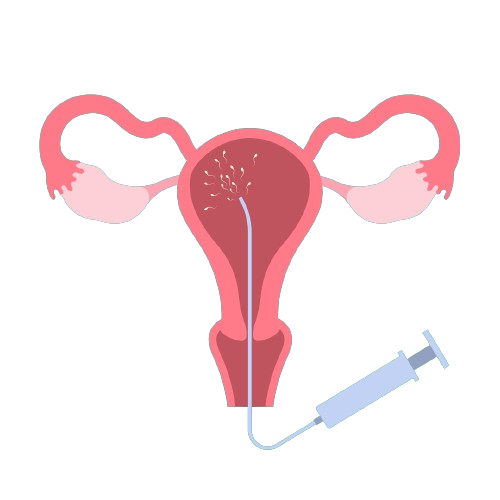
Intrauterine Insemination (IUI)
IUI involves the injection of treated sperm from the husband, partner, or donor into the woman’s uterine cavity via the cervix. It is generally a painless procedure that takes only a few minutes and is performed on an outpatient basis. The chances of success are increased if the insemination is combined with ovulation induction using small doses of fertility drugs (10-15% per cycle).
The development of the ovarian follicles is monitored with ultrasound and the insemination is timed to take place 36-40 hours after administration of the hormone injection HCG, which triggers ovulation When ovulation has occurred, the male partner is asked to produce a semen sample.
This sample is prepared in the laboratory and is then placed in the uterine cavity by means of a fine catheter. IUI should be performed in cases where the woman has healthy fallopian tubes, and the sperm preparation is satisfactory. It may also be a treatment option for women who have cervical mucus hostility and in some cases unexplained infertility
Donor insemination:
Donor insemination is the treatment used for women whose partners have no sperm in the ejaculate, or for couples who do not wish to undergo the ICSI procedure.


-
What is IUI?
IUI means intrauterine insemination, which simply means injecting the husband’s sperm into the uterus utilizing a soft plastic tube at the time of ovulation. The husband’s semen is processed in the laboratory and the motile sperms are concentrated, which are then injected into the uterus.
-
What is the process?
You will be given oral or injectable medications to grow more than one follicle (a follicle is the structure which contains the egg,). Growth of the follicle is monitored by vaginal sonography for its growth during injections, commonly called follicle study . When the follicle reaches the optimal size, hcg injection is given to start the process of ovulation. The husband’s semen is processed to concentrate the motile sperms in a small volume. These are injected into the uterus around the time of ovulation using a soft plastic tube (catheter).
-
Which day would be my IUI?
IUI is done around ovulation time which is about 38-40 hours after HCG injection.
-
Should my husband undergo tests before IUI?
Yes, detailed semen analysis, and also tests for HIV, HCV, and HBsAg need to be done before the procedure.
-
Is my husband required on the day of IUI?
Yes, the husband would be asked to produce a semen sample, this sample has to be produced on the premises of the clinic. Sample collected at home will not be accepted in the lab.
-
Is the procedure painful?
No, the IUI process does not involve any pain, as the catheter used is very soft and thin. You may experience slight discomfort similar to your transvaginal USG or a mild cramping sensation.
-
Can I go to office or do my regular routine after IUI?
You can resume your normal duties immediately after IUI. There is no need for bed rest after IUI.
-
When will I get to know if I am pregnant?
If you are not pregnant you will get your periods within 15 days after IUI. If the periods are delayed then a urine pregnancy test should be done for confirmation of pregnancy.









